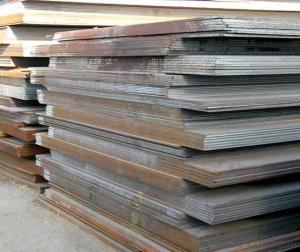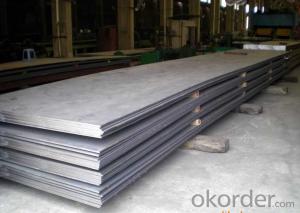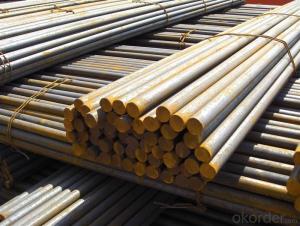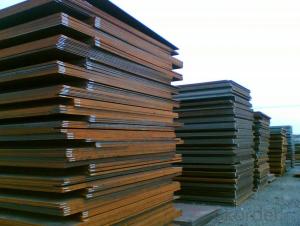Special Steel S235JR Carbon Steel Plate for LPG Cylinders Gas Cylinder
- Loading Port:
- CHINA MAIN
- Payment Terms:
- TT OR LC
- Min Order Qty:
- 30 m.t.
- Supply Capability:
- -
OKorder Service Pledge
OKorder Financial Service
You Might Also Like
Specification
Standard | DIN | ||||||||||
Grade | S235JR | ||||||||||
Width Thickness | 1500-2200mm 0.3-80mm | ||||||||||
Length | 6m,12m or as required. | ||||||||||
Tolerance | Within the allowable range or as required | ||||||||||
Condition of delivery | Hot rolled,Cold Rolled or as required. | ||||||||||
Chemical Composition(%) | |||||||||||
C | Si | Mn | P | S | Cr | ||||||
0.17-0.24 | 0.17-0.37 | 0.35-0.65 | ≤ 0.03 | ≤ 0.03 | -- | ||||||
Ni | Cu | ||||||||||
| -- | -- | ||||||||||
Mechanical Properties(In Quenching and Tempering) | |||||||||||
Tensile strength | Yield strength | Elongation | Reduction in Area | Impact | Hardness | ||||||
(σb/MPa) | (σs/MPa) | (δ5/%) | (ψ/%) | (J) | (HB) | ||||||
≥420 | ≥250 | ≥25 | ≥55 | -- | ≤156 | ||||||
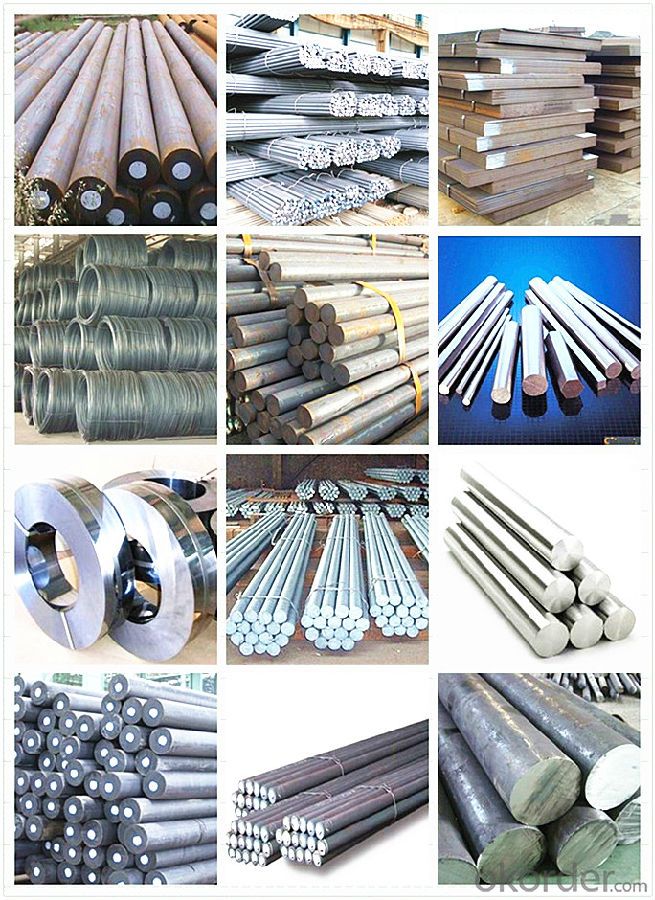
Workshop Show:
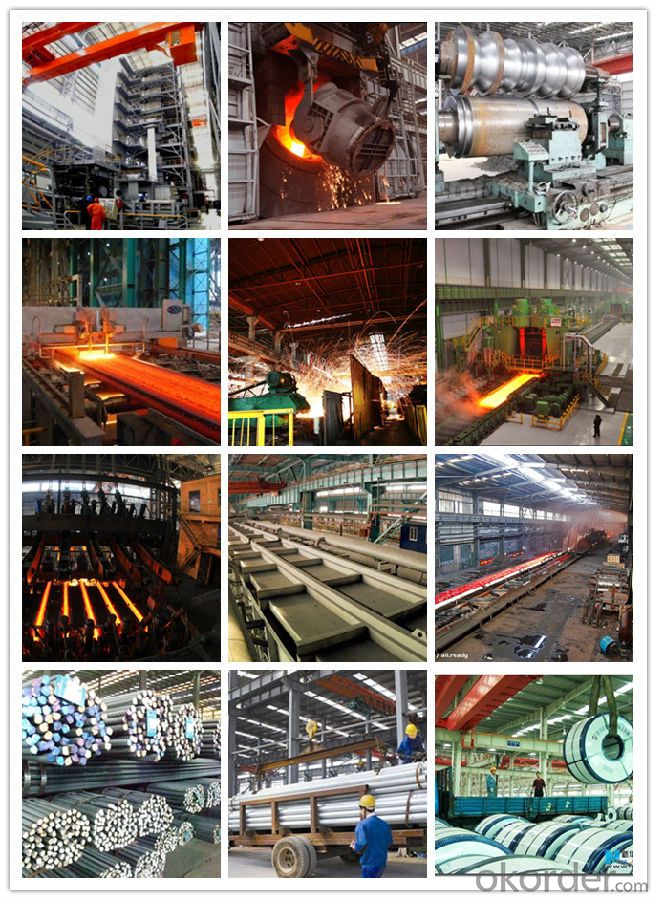
Shipping
1. FedEx/DHL/UPS/TNT for samples, Door-to-Door;
2. By Air or by Sea for batch goods, for FCL; Airport/ Port receiving;
3. Customers specifying freight forwarders or negotiable shipping methods!
4. Delivery Time: 3-7 days for samples; 5-25 days for batch goods.
5. Package Informations
1) EXPORT, In 20 feet (GW 25 ton) or 40 feet Container (GW 25 ton)
2)as customer's requirement
Why choose us?
(1) The leading exporter in China special steel industry.
(2) Large stocks for various sizes, fast delivery date.
(3) Good business relationship with China famous factories.
(4) More than 7 years steel exporting experience.
(5) Good after-sales service guarantee.
- Q: How does special steel ensure product traceability?
- Special steel ensures product traceability through various measures and processes implemented throughout its production and supply chain. Firstly, special steel manufacturers maintain detailed records of the production process, including the source of raw materials, the specific production techniques used, and the testing and inspection procedures conducted at each stage. These records allow for complete traceability, as they provide a clear history of each product from its inception to the final product. Special steel manufacturers also implement robust quality control systems, which include unique identification codes or markings assigned to each product. These codes help in tracking the product throughout its life cycle, enabling easy identification and traceability. In addition, special steel manufacturers often rely on advanced technology systems such as barcode scanning, radio frequency identification (RFID), or blockchain to track and trace their products. These systems enable real-time monitoring and recording of product movements, ensuring accurate traceability and transparency. Furthermore, special steel manufacturers maintain strong relationships with their suppliers and customers, ensuring that the entire supply chain is transparent and traceable. They collaborate closely with suppliers to validate the origin and quality of raw materials, and they work closely with customers to provide them with detailed information about the product's manufacturing process and its journey through the supply chain. Overall, special steel manufacturers prioritize product traceability by implementing strict record-keeping systems, advanced technology solutions, and maintaining transparent relationships with suppliers and customers. These measures not only ensure the quality and reliability of the special steel products but also provide customers with assurance regarding the origin and authenticity of the product.
- Q: How does special steel contribute to the marine machinery industry?
- Special steel plays a crucial role in the marine machinery industry by offering numerous advantages and contributing to the overall efficiency and reliability of marine machinery. First and foremost, special steel is known for its exceptional strength and durability. In the harsh marine environment, where machinery is constantly exposed to high levels of corrosion and extreme weather conditions, the use of special steel ensures that marine machinery can withstand these challenges and maintain its integrity over an extended period. This enhanced durability not only extends the lifespan of marine machinery but also reduces the need for frequent repairs and replacements, resulting in cost savings for shipbuilders and operators. Additionally, special steel offers excellent welding and fabrication properties, making it easier to construct complex marine machinery components. The ability to weld and fabricate special steel allows for the production of intricate and customized parts, which can be tailored to meet the specific requirements of different marine vessels. This flexibility in design ensures that marine machinery is optimized for performance, efficiency, and safety. Furthermore, special steel possesses excellent resistance to corrosion and erosion, which are common issues in marine environments due to the presence of saltwater and other corrosive agents. By using special steel, marine machinery can effectively resist corrosion, preventing premature failure and minimizing the need for maintenance. This corrosion resistance also enhances the overall safety of marine operations, as the risk of machinery malfunctioning due to corrosion-related issues is significantly reduced. In terms of efficiency, special steel contributes to the marine machinery industry by offering superior heat resistance and thermal conductivity. This allows marine machinery to operate at high temperatures without compromising performance, ensuring efficient energy conversion and optimal functioning of critical systems. The improved thermal properties of special steel also contribute to the overall fuel efficiency of marine vessels, reducing operational costs and environmental impact. In conclusion, special steel plays a vital role in the marine machinery industry by providing strength, durability, corrosion resistance, and thermal properties that are necessary for the efficient and reliable operation of marine machinery. By utilizing special steel, shipbuilders and operators can enhance the longevity, safety, and performance of marine vessels, ultimately contributing to the growth and sustainability of the marine industry.
- Q: How does special steel contribute to the energy equipment industry?
- Special steel plays a crucial role in the energy equipment industry by providing the necessary strength, durability, and resistance to extreme conditions. The energy equipment industry encompasses various sectors such as oil and gas, renewable energy, power generation, and transmission, all of which rely heavily on special steel for their infrastructure and machinery. In the oil and gas sector, special steel is used in the construction of pipelines, drilling equipment, and storage tanks. The unique properties of special steel, such as high tensile strength, corrosion resistance, and the ability to withstand high pressure and temperature, make it an ideal material for these applications. Special steel also ensures the safety and reliability of oil and gas operations, as it can withstand harsh environments, including corrosive substances and extreme weather conditions. In the renewable energy sector, special steel is used in the manufacturing of wind turbines, solar panels, and hydroelectric power systems. These energy sources require strong and lightweight materials that can withstand constant exposure to nature's elements. Special steel alloys, such as high-strength low-alloy (HSLA) steel and stainless steel, are commonly used to construct the infrastructure of renewable energy systems, ensuring their longevity and efficiency. Furthermore, special steel is essential in power generation and transmission equipment. It is utilized in the manufacturing of gas turbines, steam turbines, and generators. Special steel alloys can endure the high temperatures and pressures generated during power generation processes, ensuring the efficiency and reliability of energy production. Additionally, special steel is used in the transmission infrastructure, including transmission towers and power cables, to support the efficient and safe transfer of electricity over long distances. Overall, special steel contributes significantly to the energy equipment industry by providing the necessary strength, durability, and resistance to extreme conditions. It enables the construction of reliable and efficient infrastructure, ensuring the smooth operation of energy systems, whether in oil and gas, renewable energy, or power generation and transmission.
- Q: What are the different types of mold steel?
- There are several types of mold steel used in various industries, such as tool steel, stainless steel, and carbon steel. Tool steel is commonly used for high-volume production molds due to its excellent hardness, wear resistance, and toughness. Stainless steel is preferred for molds that require corrosion resistance and can withstand high temperatures. Carbon steel, on the other hand, is often used for less demanding applications where cost-effectiveness is a priority.
- Q: How is tool and die steel used in the manufacturing of molds and dies?
- Tool and die steel is essential in the manufacturing of molds and dies as it provides the required strength, hardness, and durability to withstand the high pressures and temperatures involved in the molding process. It is used to create the core and cavity sections of molds as well as the various components of dies. The steel is carefully selected based on its specific properties to ensure optimal performance and longevity in the production of molds and dies.
- Q: How does special steel contribute to the automotive aftermarket?
- Special steel plays a significant role in the automotive aftermarket by contributing to the development and enhancement of various automotive components. This high-quality steel is specifically engineered to possess exceptional strength, durability, and resistance to wear and tear. One of the primary ways special steel contributes to the automotive aftermarket is through the production of performance parts. These parts are designed to improve the performance and efficiency of vehicles, catering to the needs and preferences of car enthusiasts. For example, special steel is used in the manufacturing of exhaust systems, turbochargers, and intake manifolds, allowing for increased horsepower and torque, as well as improved fuel efficiency. Additionally, special steel is utilized in the production of suspension components, such as coil springs and sway bars, which provide superior handling and stability. These components not only enhance the driving experience but also ensure the safety of the vehicle and its occupants. Furthermore, special steel is instrumental in the manufacturing of braking systems, including rotors and brake calipers. These components are crucial for effective braking and maintaining control over the vehicle. By utilizing special steel, aftermarket brake systems can offer improved stopping power, reduced fade, and increased resistance to high temperatures. Moreover, special steel is employed in the production of engine components, such as crankshafts, connecting rods, and valve springs. These components are subjected to extreme forces and temperatures, and special steel's exceptional strength and heat resistance enable them to withstand such conditions, resulting in improved engine performance and longevity. In summary, special steel plays a vital role in the automotive aftermarket by contributing to the development of high-performance parts, suspension components, braking systems, and engine components. Its superior strength, durability, and resistance to wear and tear ensure improved vehicle performance, efficiency, and overall driving experience.
- Q: Is the steel column of the steel structure HM a special steel?
- H steel is a new type of economical construction steel. H type steel cross section shape is reasonable in economy, good mechanical properties, rolling each point on the extended section is uniform, small internal stress, compared with the ordinary beam, a section modulus, light weight, saving advantages of metal, can make the building structure to reduce 30-40%;
- Q: How does special steel contribute to reducing product defects during manufacturing?
- Special steel contributes to reducing product defects during manufacturing by offering superior strength, durability, and resistance to corrosion. It ensures the production of high-quality components that are less prone to wear, deformation, or breakage, minimizing the occurrence of defects. Additionally, special steel's consistent composition and precise manufacturing processes enable tighter tolerances, resulting in more accurate and reliable products.
- Q: How is special steel protected against corrosion?
- Special steel is protected against corrosion through various methods such as applying a protective coating, using corrosion-resistant alloys, or implementing techniques like passivation and electroplating.
- Q: What are the different methods of improving the toughness of special steel?
- To enhance the toughness of special steel, various techniques can be utilized. One effective method involves the addition of alloying elements such as nickel, chromium, or manganese to the steel composition. These elements contribute to increased strength and resistance to cracking or fracturing. Another approach is to apply heat treatment processes like quenching and tempering. Quenching rapidly cools the steel from a high temperature, resulting in a hardened structure. On the other hand, tempering involves reheating the quenched steel to a specific temperature and then slowly cooling it. In addition, grain refinement techniques can be employed to improve toughness. Controlling the size and distribution of grains within the steel enhances its resistance to fracture. Methods like grain size control through recrystallization and severe plastic deformation can be used to refine the grain structure. Furthermore, maintaining low impurity content in the steel is crucial for its toughness. Impurities like sulfur and phosphorus can cause brittleness, so refining and purification processes should be employed to reduce their presence. Moreover, surface treatment methods such as shot peening or surface hardening can be implemented. Shot peening involves bombarding the steel surface with small spherical particles to induce compressive stress, which helps in resisting crack propagation. Surface hardening techniques like carburizing or nitriding create a hardened layer on the surface, enhancing toughness. In conclusion, improving the toughness of special steel can be achieved through alloying, heat treatment, grain refinement, impurity control, and surface treatment. These techniques can be used individually or in combination to enhance the steel's properties and make it more resistant to cracking or fracturing.
Send your message to us
Special Steel S235JR Carbon Steel Plate for LPG Cylinders Gas Cylinder
- Loading Port:
- CHINA MAIN
- Payment Terms:
- TT OR LC
- Min Order Qty:
- 30 m.t.
- Supply Capability:
- -
OKorder Service Pledge
OKorder Financial Service
Similar products
Hot products
Hot Searches
Related keywords
